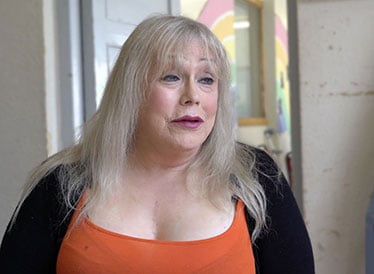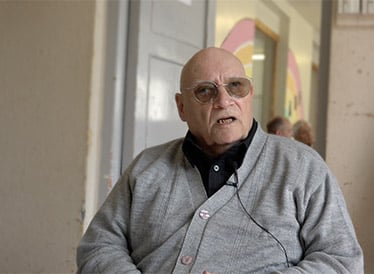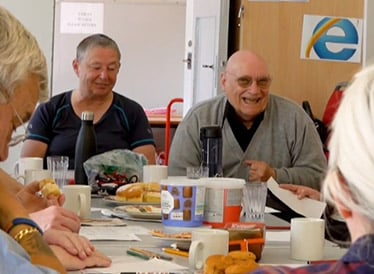There are an estimated 1 million lesbian, gay and bisexual people aged 55 or over in Britain today. As attitudes change and older LGBT+ people have become more visible in society, Age UK has an important role to play in ensuring the information we provide is inclusive for everyone.
Age UK's website acts as an information and advice hub for many of the issues and challenges relating to growing older in the UK, and it's visited by millions of people every year. But no two 'older people' are the same. Reflecting the diversity of people's experiences of later life is something we try to keep at the heart of the information we provide.
The Stonewall riots of 1969 sparked the advent of the gay rights movement in the UK, heralding changes that have continued apace since. With the LGBT+ community evolving all the time, accurately reflecting the experiences of its older members is key. Our team set about creating a new section of the Age UK website dedicated to this, working closely with older LGBT+ people.
Reflecting new attitudes
In order to successfully develop our LGBT+ section, Age UK consulted an all-important focus group: its intended audience. A visit to Age UK Oldham’s older lesbian, gay, bisexual and transgender (OLGBT) out and about group on 28 June 2019, the 50th anniversary of the Stonewall riots, provided the perfect opportunity to canvas opinion, which helped establish five central themes.
- LGBT+ rights. As many older people have experienced society’s changing attitudes towards LGBT+ people it was important to ensure they weren’t disconnected from their rights today. While most of the issues relating to later life are the same for everyone, some matters need more consideration and it's important people are informed of this.
- Dealing with discrimination. Many older people feel a sense of vulnerability, as do many LGBT+ people. Sadly, many older LGBT+ people may be more likely to experience prejudice, it's therefore vital that older LGBT+ people know what to do if they feel discriminated against.
- Health and wellbeing. Historically, many LGBT+ people faced difficulties accessing health services. It was important to emphasise that everyone’s health is as important as each other’s and so LGBT+ people shouldn’t feel they cannot discuss anything with their GP.
- Staying connected. 1.4 million people aged 50 and over in England often feel lonely. The need to stay connected has never been more prominent, but so too has the technology to make it possible for likeminded people with similar experiences to communicate.
- Issues affecting trans people. There are many issues that only affect trans people, and that is true of any age. However, there are some particularly issues that are compounded in later life. A person's experience of being trans will be influenced by how old they were when they transitioned, and when that was. But transitioning can make people feel more 'themself' and bring feels of self-scceptance at any age.
“There’s a point when you stop hiding.”

Dawn, a transgender woman, suggested that as an older LGBT+ person it’s easy to feel "remote and isolated". As a child, Dawn was the victim of abusive behaviour when she told others she felt more like a girl than a boy. "I went to see my GP at 14 because I realised I was a girl,” she explained. "I was told they could offer me electroshock convulsive treatment, aversion therapy and drugs to make me feel better, meaning more masculine." As a result, she decided to hide her feelings, and went down the ‘traditional’ route of getting married and having kids.
After Dawn stumbled across a trans group in Manchester, she slowly started to accept her identity. With a supportive doctor offering advice, she took the plunge and fully embraced her new life. "It’s called a transition and a transition means a journey, and a journey has to end sometime. There’s a point when you stop hiding."
Connecting with the community
“You don’t walk through that door have the ‘T’ label over your head,” explains Dawn of the warm welcome she received at Age UK Oldham. “You’re one of the group and that’s the beauty of it.” Since Dawn joined the Out and About group in Oldham she’s made a new group of friends she feels comfortable around. Her words emphasise the need of many older LGBT+ people to have a sense of community and be part of a social unit with which they can readily identify, connect and feel accepted.
LGBT+ support
Our LGBT+ section is here to offer information, help you understand your rights and provide advice on ways to be better connected.
“I thought, well, there must be something wrong with me.”

Terrence, the man who captured the nation’s hearts at Christmas by shining a light on the loneliness experienced by millions of older people in the UK, is an avid member of the OLGBT group at Age UK Oldham.
He described growing up as a gay man and its challenges, saying “when I was about 14, I couldn’t understand about liking men. I thought I was the only one in the world. I thought, well, there must be something wrong with me.” Sadly, this was not an isolated sentiment but one shared by many of the group and was particularly heartfelt.
Terrence explained how he had to face many issues and barriers on the way, including the negative attitudes of others. He described keeping his sexuality secret as there was “nothing in those days to go to, no advice or anything” due to the criminalisation of homosexuality then.
Knowing how Terrence felt when he had nowhere to turn to advice highlighted the importance of creating a space for older LGBT+ people to find support, understand their rights and make sure they're always respected.
Helping people to be themselves
Following his mum’s death and his partner of four-and-a-half years ending their relationship, Terrence found himself in a dark place. He explained “before I came to the group, I had a severe bout of depression.” But fortunately, a friend informed him of the OLGBT group, which has since changed his life.
His appreciation for the group was evident when he said “we’re a good group, a friendly group. The door is always open. We aim to be a family for everybody.” And that is certainly the impression you get when you enter their space and witness the laughter, the chatter and the general sense of fun and connection. Many older LGBT+ people find it difficult to stay in touch with friends and family, and might feel that certain social groups aren't for them, with many saying they feel lonely. By ensuring a directory of LGBT+ services was included on the Staying connected page, Age UK aimed to encourage older LGBT+ people to interact with eachother, to help people feel less alone.
Once Terrence had come to terms with his own sexuality, he explained that because of his own experiences he felt more able to “help other people to be themselves.” Terrence has embraced Age UK, assists with volunteering and offering support to other members of the OLGBT group.
Age UK Oldham
Find out about the services, activities and events for older people in the area.
Taking inspiration from the voices of older LGBT+ people
Visiting the group highlighted the importance of feeling informed and supported within the LGBT+ community. It emphasised the need for groups to connect, like this, where people can relax, get informed, be themselves and not feel judged. These conversations led to the development of the LGBT+ hub, as an easy to use space offering useful advice and support tailored to the needs of LGBT+ people.
The Pride celebrations over the summer provided an excellent opportunity to develop this content, as not only is it a time for celebration but it also is a time where many LGBT+ people consider their place in society.
Age UK is committed to exploring and understanding the full diversity of what it means to grow older in the UK. That's why we'll continue to work with those who have perhaps not always had their voices heard, to ensure the information and advice we provide is meaningful for more people in later life.



